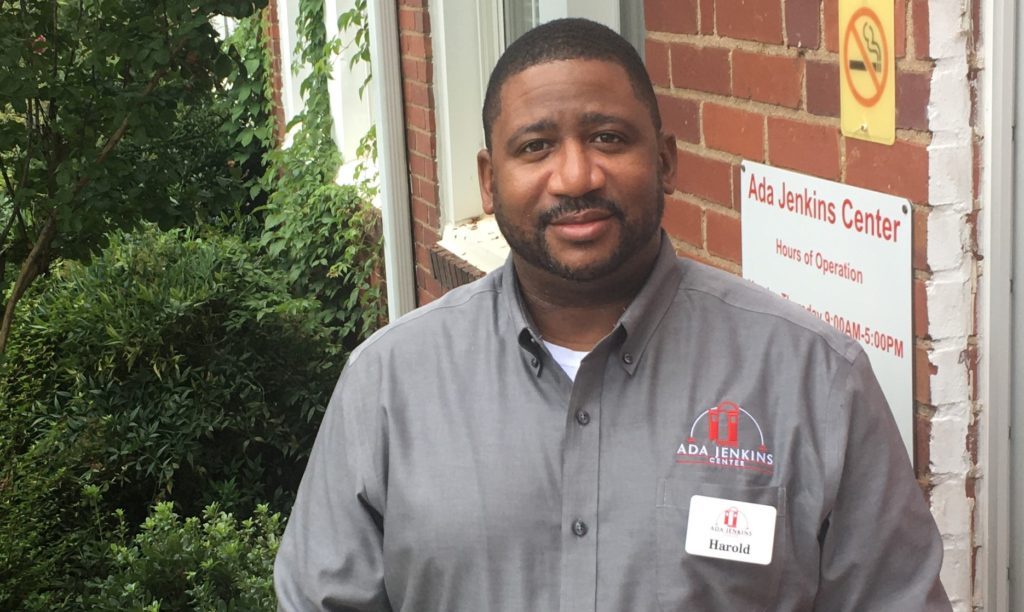
By Dave Yochum. With all the affluence around North Meck it’s easy to overlook literally thousands of neighbors who live their lives on the margins. They’re even more marginalized with the COVID-19 pandemic in full swing, says Harold Rice, the new CEO of the Ada Jenkins Center in Davidson.
The non-profit, which has a budget of about $1.5 million and nearly three dozen staffers, has helped people in Cornelius, Davidson and Huntersville with anything from back rent and utilities to food and dental care for decades. The hub for education and community services has had more than 11,000 “client touches” so far this year and the number is rising fast.
All this is in a larger setting where Charlotte comes in 50th out of 50 cities in terms of upward social mobility. A study from Harvard and UC Berkley found that a child born in the bottom income quintile in Charlotte has only a 4.4 percent chance of reaching the top quintile. This 4.4 percent chance put Charlotte at the very bottom of 50 large cities for social mobility.
The study came out not long before the violent protests that came in the wake of the Keith Lamont Scott shooting in 2016. There are great gaps between the middle class and the poor.
No guard rails
“The families we serve do not have guard rails,” Rice said, explaining that clients who cobble together two or more part-time jobs are living from paycheck to paycheck, almost always without health insurance. For example, there was a family living in tents in the woods behind the Lake Norman Chamber of Commerce, less than a mile from million-dollar homes, but within easy walking distance to employment and public transit.
Rice replaced Georgia Krueger, who retired after 12 years with Ada Jenkins, on July 1.
Explaining that it’s an honor to step into the leadership position that was held by Krueger for so long, Rice said one of the biggest challenges society faces is how to help the children and families who are the most vulnerable. “This is especially true during this COVID-19 pandemic when so many in our community are suffering the health and economic effects of this dreadful virus,” he said.
Rice, who lives in Huntersville with his wife and a 5-year-old son, was vice president and chief operating officer at Community Link Programs of the Travelers Aid Society in Charlotte, a non-profit organization that works with individuals and families to obtain and sustain affordable and safe housing. He joined Community Link in 2007 and also served as director of housing programs and program manager for homeless services.
The UNC-Pembroke graduate has also worked with low-income families on how to increase their ability to become self-sufficient.
Rice said his father, a researcher at the Heineman Medical Research Laboratory, is his hero. He set an example of going to work every day—and understanding a basic human equation:
Decisions over choices equal consequences.
“As a Black man, my decisions could always land me somewhere else. He was mindful of my friends. He wanted to make sure I was making good decisions,” Rice said.
He also encouraged him to be brave and bold.
“Nobody is talking about people that don’t do anything,” Rice said.
In 2019, Ada Jenkins served more than 2,600 individuals and families in Cornelius, Davidson and Huntersville.
COVID effect
COVID-19 is making things harder for families and the organization. Businesses which employ hourly and tip-based workers have cut back, while some have closed. Front-line workers are more likely to become ill.
“A lot are working at your fast-food restaurants, your Amazons, your lower-level jobs,” he said. It’s how an illness can send a family spiraling into homelessness in a matter of weeks.
“There is a saying let’s not waste a crisis,” the Pfeiffer University MBA says.
He is looking at efficiencies, as well as a day-time school program for remote learning options. “We want to make sure the child is still focused on their work and to make sure there is not digital divide,” Rice said. The need is huge, especially among those who have nothing to spare.
There are more than 5,000 homeless children in the Charlotte Mecklenburg Schools system.
“We want to serve the family holistically,” the Olympic High grad explained. Ada Jenkins has traditionally been about helping people achieve stability.
Education during traditional school hours is new. To assist parents who are working and/or taking educational classes or training, Ada Jenkins has instituted a LEARN Works Day Program, in which teachers and volunteers will supervise students’ remote learning. Classes will operate at 50 percent capacity, and will require face coverings, social distancing and hand-washing/sanitizing.

Discussion
No comments yet.